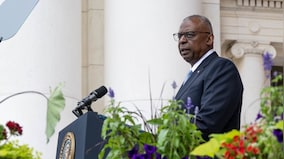United States Secretary of Defense Lloyd Austin addressed top security officials on Saturday, emphasising that war with China is neither imminent nor inevitable, despite increasing tensions in the Asia-Pacific region. He highlighted the need for renewed dialogue between him and his Chinese counterpart to prevent “miscalculations and misunderstandings.”
Austin made these remarks at the Shangri-La defense forum in Singapore, a day after a more than hour-long meeting with Chinese Defense Minister Dong Jun. This meeting was the first in-person discussion between the top defense officials since military contacts between the U.S. and China were severed in 2022 following then-U.S. House Speaker Nancy Pelosi’s visit to Taiwan, which had angered Beijing.
Both sides maintained their established positions on Taiwan, which China claims and has not ruled out taking by force, and on China’s extensive claims in the South China Sea, which have led to direct confrontations with other regional nations, especially the Philippines. Austin did not disclose details of their conversation but emphasized the significance of resuming dialogue.
Philippine President Ferdinand Marcos Jr., addressing the same forum on Friday night, stressed the high stakes involved. He stated that if a Filipino were killed in confrontations with China over South China Sea claims, it would be “very, very close to what we define as an act of war and therefore we will respond accordingly.”
Marcos added that he assumed the Philippines’ treaty partners, which include the U.S., “hold the same standard.”
In his own speech, Austin lauded how Marcos “spoke so powerfully last night about how the Philippines is standing up for its sovereign rights under international law.” But when pressed later, he would not say how the U.S. might react if a Filipino were killed in a confrontation with China, calling it hypothetical.
He did say the U.S. commitment to the Philippines as a treaty partner is “ironclad,” while again stressing the importance of dialogue with China.
“There are a number of things that can happen at sea or in the air, we recognize that," he said. “But our goal is to make sure that we don’t allow things to spiral out of control unnecessarily.”
Beijing in recent years has been rapidly expanding its navy and is becoming growingly assertive in pressing its claim to virtually the entire South China Sea, posing security threats for many countries.
Australian Deputy Prime Minister and Defense Minister Richard Marles noted that not only had Philippine ships been rammed and hit with water cannons by China, but said a Chinese warplane dropped flares above an Australian helicopter earlier in the year, and in November a Chinese navy ship injured Australian divers in Japanese waters with sonar.
The U.S., meantime, has been ramping up military exercises in the region with its allies to underscore its “free and open Indo-Pacific” concept, meant to emphasize freedom of navigation through the contested waters, including the Taiwan Strait.
Chinese Senior Col. Cao Yanzhong, a researcher at China’s Institute of War Studies, asked Austin whether the U.S. was trying to create an Asian version of NATO with its emphasis on partnerships and alliances, a common Chinese claim. He suggested that could trigger conflict with China, citing ally Russia’s claim that NATO’s eastward expansion was a threat, which President Vladimir Putin has used as an excuse for his invasion of Ukraine.
“The eastern expansion of NATO has led to the Ukraine crisis,” Cao said. “What implications do you think the strengthening of the U.S. alliance system in the Asia-Pacific will have on this region’s security and stability?”
Austin said the U.S. is simply cooperating with “like-minded countries with similar values” and not trying to create a NATO-type alliance, while rejecting Cao’s interpretation of the cause of the Ukraine war.
With inputs from agencies.







)
)
)
)